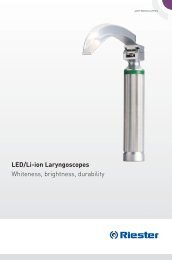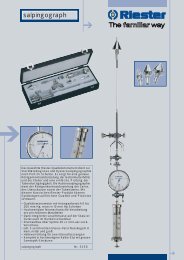Halma Code of Conduct - Riester
Halma Code of Conduct - Riester
Halma Code of Conduct - Riester
- No tags were found...
You also want an ePaper? Increase the reach of your titles
YUMPU automatically turns print PDFs into web optimized ePapers that Google loves.
Integrity in BusinessThe <strong>Halma</strong> <strong>Code</strong> <strong>of</strong> <strong>Conduct</strong>
<strong>Halma</strong> <strong>Code</strong> <strong>of</strong> <strong>Conduct</strong> – September 2011This <strong>Code</strong> <strong>of</strong> <strong>Conduct</strong> summarises our ethical commitment. It <strong>of</strong>fers guidelines and policies that definehow we run our business. It will help deliver consistently high standards <strong>of</strong> conduct throughout theGroup, reinforcing our reputation around the world. We expect our business partners, as well as ouremployees, to act with similarly high ethical standards.The <strong>Code</strong> should help our employees and business partners identify and avoid situations that mightviolate legislation and best practice. Understanding the relevant laws around the world is not alwayseasy but this <strong>Code</strong>, encompassing <strong>Halma</strong>‟s policies on Bribery and Corruption, Conflicts <strong>of</strong> Interest,Insider Dealing and Whistleblowing, covers the major areas. It cannot deal with every circumstance soif it does not give you enough guidance about how to deal with a particular situation, consult yourmanager, MD, Divisional Chief Executive or the <strong>Halma</strong> Company Secretary.Compliance with the <strong>Code</strong> is not only <strong>of</strong> concern to <strong>Halma</strong>, the business, but also to each employee.For example, bribery is illegal and will expose the business to prosecution, fines and loss <strong>of</strong> reputation.However, it could also expose employees personally to penalties including fines and, in extreme cases,even imprisonment.If you are aware <strong>of</strong> any employee or operation involved in illegal acts or acting contrary to the <strong>Code</strong> <strong>of</strong><strong>Conduct</strong>, you must immediately report it to your manager, MD, Divisional Chief Executive or the <strong>Halma</strong>Company Secretary. If you have any concern over how your complaint might be handled by your linemanager, please use the Whistleblowing policy (see page 17).Compliance with the <strong>Code</strong> is mandatory across the Group worldwide. We all share responsibility forensuring that individually and collectively we are complying with this <strong>Code</strong>. I know that I can count onyour support and will always do what I can to support you in doing the right thing.RegardsAndrew WilliamsChief Executive
<strong>Halma</strong> <strong>Code</strong> <strong>of</strong> <strong>Conduct</strong> – September 2011CONTENTSPageIntroduction to the <strong>Halma</strong> <strong>Code</strong> <strong>of</strong> <strong>Conduct</strong> 1Supporting Information Glossary 3 Additional sources <strong>of</strong> information 3Bribery and corruption What is bribery? 4 Entertainment, gifts and promotional spend 5 Charitable giving 7 Political payments and involvement 8 Facilitation payments 10 Business relationships 12 Accuracy <strong>of</strong> recording and reporting 13Insider dealing and price sensitive information 14Conflicts <strong>of</strong> interest 15Whistleblowing Principles, policy and guidance 17 Contact details 20
<strong>Halma</strong> <strong>Code</strong> <strong>of</strong> <strong>Conduct</strong> – September 2011INTRODUCTION TO THEHALMA CODE OF CONDUCT( co ntinued)Who does it apply to?It applies to all <strong>Halma</strong> operations, their <strong>of</strong>ficers andemployees.<strong>Halma</strong>‟s business partners need to be made aware <strong>of</strong>the <strong>Code</strong> and should apply broadly similar ethicalstandards in their operations.Where does it apply?<strong>Halma</strong> operates worldwide and this <strong>Code</strong> applies to allits worldwide operations.When does it apply?It applies at all times.Newly acquired companies will adopt the <strong>Code</strong> from thedate they join <strong>Halma</strong>.What happens if someone breaches the <strong>Code</strong>?Non-compliance is a very serious matter. It can lead tocivil or criminal sanctions against <strong>Halma</strong>, its employeesand business partners. It can also lead to:o Internal disciplinary action for employees, up toand including dismissal.o Immediate termination <strong>of</strong> any agreement with abusiness partner.Getting more information or clarificationQuestions on the application <strong>of</strong> the <strong>Code</strong> which cannotbe resolved locally should be addressed to the <strong>Halma</strong>Company Secretary (see page 20 for contact details).Page 2
<strong>Halma</strong> <strong>Code</strong> <strong>of</strong> <strong>Conduct</strong> – September 2011SUPPORTING INFORMATIONGlossaryThroughout this <strong>Code</strong> <strong>of</strong> <strong>Conduct</strong> you will find certain termsused which have the following meanings:<strong>Halma</strong> or Group<strong>Halma</strong> p.l.c. and any or all <strong>of</strong> its subsidiaries.DCEDivisional Chief Executive.Associated PersonSomeone (an individual or a business) who performsservices for or on behalf <strong>of</strong> <strong>Halma</strong>. This can include:Officers and employees.Parent or subsidiary companies.Joint ventures.Agents, contractors and consultants depending on theircontractual terms.Public OfficialA person who either:Holds a legislative, administrative or judicial position <strong>of</strong>any kind, appointed or elected, <strong>of</strong> a country or territory.Exercises a public function for or on behalf <strong>of</strong> anycountry or territory, or for or on behalf <strong>of</strong> any publicagency or public enterprise <strong>of</strong> that country.Is an <strong>of</strong>ficial or agent <strong>of</strong> a public internationalorganisation, such as the UN.Additional sources <strong>of</strong> informationEach section <strong>of</strong> the <strong>Code</strong> may have a reference to additionalsources <strong>of</strong> information, usually <strong>Halma</strong> policy or procedurenotes, which expand on the <strong>Code</strong>. These additional notesare available from the <strong>Halma</strong> Intranet as follows:Using the search function, search for the note reference(for example „A12‟ or „BC/2/4‟).Clicking on „Documents‟, then „Policy and ProcedureNotes‟, will take you to the full Procedure Note indexwhich you can scroll through to find the note you need.If you do not have Intranet access, copies <strong>of</strong> the documentscan be obtained from your manager or MD.Page 3
<strong>Halma</strong> <strong>Code</strong> <strong>of</strong> <strong>Conduct</strong> – September 2011WHAT IS BRIBERY?PrinciplesBribery is a criminal <strong>of</strong>fence, defined as:“the <strong>of</strong>fer, promise or gift <strong>of</strong> a financial or other advantage,with the intention <strong>of</strong> inducing or rewarding the improperperformance <strong>of</strong> a function or activity.”It does not matter if:the person <strong>of</strong>fering the bribe is the person who willbenefit from the improper performance.the person receiving the bribe is the person who willcarry out the improper performance.PolicyThe Group, from the <strong>Halma</strong> p.l.c. Board down, has a zerotolerance attitude towards bribery and corrupt practices in allits business dealings. Such practices are never acceptableand will not be tolerated. Therefore:You should never accept a bribe.You should never seek to influence the actions <strong>of</strong> a thirdparty toward <strong>Halma</strong> by <strong>of</strong>fering or paying a bribe.You should never ask or authorise an AssociatedPerson or any other business partner to <strong>of</strong>fer or pay abribe on your behalf.GuidanceAt its most basic level, a bribe is an improper financialpayment such as a kickback. However, because a bribeactually involves the <strong>of</strong>fer <strong>of</strong> an advantage, there are actionsbeyond a simple payment which might be seen as corrupt.For example: Giving or receiving excessive hospitality and gifts(see page 5). Making inappropriate charitable donations (see page 7). Making or providing political payments and support(see page 8). Making facilitation payments (see page 10). Making payments to intermediaries disproportionate tothe service provided (see page 12).Key QuestionsYou should always consider thereasons underlying any action andif you have any doubts about itslegality or purpose, ask yourselfthese two questions:Would I be happy to justify myposition if the details <strong>of</strong> thisappeared in a nationalnewspaper?Would I be happy if I found outthat my main businesscompetitor was doing this?If the answer to either <strong>of</strong> thesequestions is no, then there areclearly concerns and you shouldseek guidance from your manager,MD, DCE or the <strong>Halma</strong> CompanySecretary before proceeding.If you have a concernGet a better understanding <strong>of</strong>Group policy by reading theappropriate policy, procedureand explanatory notes (seeadditional sources <strong>of</strong>information below).Raise it with your manager,MD, DCE or the <strong>Halma</strong>Company Secretary.If you feel that you cannot talkto them, contact the ExpolinkWhistleblowing hotline (seepage 17).Additional sources <strong>of</strong>information<strong>Halma</strong> Procedure Notes BC/1/1(Bribery and corruption policystatement) and BC/1/2 (Briberyand corruption control procedure)available on the <strong>Halma</strong> Intranet(see page 3 for details <strong>of</strong> how toaccess).Page 4
<strong>Halma</strong> <strong>Code</strong> <strong>of</strong> <strong>Conduct</strong> – September 2011ENTERTAINMENT, GIFTS ANDPROMOTIONAL SPENDPrinciplesGifts and entertainment are useful for building andmaintaining relationships between business partners.However, they may be seen as creating a conflict <strong>of</strong> interestby placing the recipient under an obligation to the giver,making them more likely to favour the giver in businessdecisions. This is particularly the case if spend levels areexcessive or unreasonable compared to the status <strong>of</strong> therecipient or to local business customs.PolicyYou should never directly ask for a gift or hospitality.Reasonable gifts, hospitality and other promotionalexpenditure may be both provided or accepted so longas they:o Have a clear business purpose.o Are appropriate to the seniority <strong>of</strong> the recipient andare in line with local business customs.o Are not intended to influence the recipient‟s actionstoward the giver.o Do not contravene local laws or the recipient‟s own<strong>Code</strong> <strong>of</strong> <strong>Conduct</strong>.o Are visible – properly authorised, recorded andaccounted for.GuidanceThere is nothing wrong or inappropriate about giving orreceiving small gifts or reasonable entertainment andhospitality - the difficulties come in judging what isappropriate and what is not. Key to this are purpose, valueand visibility.PurposeAny gift or hospitality should be seen as astraightforward way <strong>of</strong> building or maintaining therelationship. If there is any chance it will be perceivedas a means <strong>of</strong> influencing or rewarding the recipientthen it should not be <strong>of</strong>fered or accepted. Therefore it isbetter to avoid giving or receiving gifts or hospitality atkey points during negotiations.There should be a business purpose to hospitality.Employees from both the giver‟s and the recipient‟sorganisations should be at any event, otherwise there isno scope for business discussion.Key questionsIf you have any doubts about thelegality, purpose, or value <strong>of</strong> a giftor hospitality, ask yourself thesefour questions:Will it be seen as beingintended to influence therecipient‟s business decision?Is it prohibited by local laws orthe recipient‟s <strong>Code</strong> <strong>of</strong><strong>Conduct</strong>?Does the value or naturemean I feel uncomfortableabout accepting it?Does its value or nature meanthat I need my MD‟s approvalbefore I <strong>of</strong>fer (or accept) it?If the answer to any <strong>of</strong> thesequestions is yes, seek guidancefrom your manager, MD, DCE orthe <strong>Halma</strong> Company Secretarybefore proceeding.If you have a concernGet a better understanding <strong>of</strong>Group policy by reading theappropriate policy, procedureand explanatory notes (seeadditional sources <strong>of</strong>information below).Raise it with your manager,MD, DCE or the <strong>Halma</strong>Company Secretary.If you feel that you cannot talkto them, contact the ExpolinkWhistleblowing hotline (seepage 17).Additional sources <strong>of</strong>informationExplanatory note BC/2/1(Entertainment, gifts andpromotional spend) available onthe <strong>Halma</strong> Intranet (see page 3 fordetails <strong>of</strong> how to access).Page 5
<strong>Halma</strong> <strong>Code</strong> <strong>of</strong> <strong>Conduct</strong> – September 2011CHARITABLE GIVINGPrinciplesSupporting charities is a good and positive thing to do but itis not really part <strong>of</strong> <strong>Halma</strong>‟s corporate role. Rather thanmaking corporate decisions about the merits <strong>of</strong> worthwhilecauses, <strong>Halma</strong> would rather ensure that its stakeholdersreceive the best possible rewards so allowing them toindividually support their personal interests.Charitable payments can pose problems if they are seen asa way <strong>of</strong> channelling funds to reward a third party bysupporting their favoured cause.PolicyThe Group has no large-scale charitable giving programmebut there is no prohibition on low-level local giving by <strong>Halma</strong>companies, provided that donations:Are small compared to the size <strong>of</strong> the business, normallyless than GBP 250 (or local equivalent).Are to a registered charity, or a well-recognised andindependent equivalent, whose purpose benefits a widesection <strong>of</strong> the population rather than a few individuals.Are not made in expectation <strong>of</strong> reward.Do not contravene local legislation.<strong>Halma</strong> companies are allowed to fund student scholarshipsas a positive way <strong>of</strong> interacting with their local communityprovided that the means <strong>of</strong> choosing the beneficiary isdemonstrably fair and open.There is no intention to prevent employees continuing toorganise their own fund-raising activities and charitablegiving programmes. These should continue to be agreedwith local management.GuidanceIt is important that there is proper visibility and approval <strong>of</strong>this type <strong>of</strong> expense, therefore:Charitable donations within the above levels need yourMD to sign <strong>of</strong>f the payment.Donations that do not meet these criteria must haveDCE sign<strong>of</strong>f and be recorded in a register which will bereviewed by Group staff.Donations must be properly recorded in the accountingrecords and correctly shown in financial reports.Key questionsIf you have any doubts aboutwhether a charitable donation isappropriate, ask yourself thesequestions:Am I satisfied that this is abona fide charity?Is the charity independent <strong>of</strong>any business relationship?Is the donation allowed bylocal legislation?If the answer to any <strong>of</strong> thesequestions is no, then you shouldnot <strong>of</strong>fer the donation without firstseeking guidance from yourmanager, MD, DCE or the <strong>Halma</strong>Company Secretary.If you have a concernGet a better understanding <strong>of</strong>Group policy by reading theappropriate policy, procedureand explanatory notes (seeadditional sources <strong>of</strong>information below).Raise it with your manager,MD, DCE or the <strong>Halma</strong>Company Secretary.If you feel that you cannot talkto them, contact the ExpolinkWhistleblowing hotline (seepage 17).Additional sources <strong>of</strong>informationExplanatory note BC/2/2(Charitable giving) available on the<strong>Halma</strong> Intranet (see page 3 fordetails <strong>of</strong> how to access).Page 7
<strong>Halma</strong> <strong>Code</strong> <strong>of</strong> <strong>Conduct</strong> – September 2011POLITICAL PAYMENTS ANDINVOLVEMENTPrinciples<strong>Halma</strong> is a non-political organisation and so supporting localpolitical activity, either by making donations or by otherforms <strong>of</strong> involvement, is difficult to justify. Relationships withpoliticians and other public <strong>of</strong>ficials are also likely to bequestioned as to their underlying purpose, especially if theperson has influence in areas where the company hasactivities. However there is a place for proper politicallobbying where the intention is to openly convey the Group‟sviews and concerns to policy makers.Policy<strong>Halma</strong>‟s policy is straightforward:There is a total prohibition on political payments <strong>of</strong> anykind by or on behalf <strong>of</strong> the Group.The use <strong>of</strong> lobbying organisations to represent <strong>Halma</strong>‟sviews is permitted provided they are independent andthe relationship is properly authorised by your DCE.Using politicians or public <strong>of</strong>ficials as consultants, oremploying them after leaving <strong>of</strong>fice, requires carefulconsideration and authorisation by your DCE before anyrelationship is agreed.You are welcome to participate in your local politicalprocess as an individual citizen but you must not involveyour employment or company in that participation.GuidanceA political payment is “a contribution, in cash or in kind,aimed at supporting a political cause.”“Political cause” can include:A political party (or equivalent).Party affiliated organisations.Party aligned research and lobby groups.Individual politicians.Individual candidates.“Contributions” include:Loans, pledges, gifts, dues and subscriptions.Fees or tickets for conferences, dinners or other fundraisingevents.Key questionsIf you have any doubts about aproposed payment or relationship,ask yourself:Is the recipient a political partyor cause?Is this a relationship with apublic or political figure?Will this payment orrelationship be perceived as away <strong>of</strong> seeking undueinfluence?If the answer to any <strong>of</strong> thesequestions is yes, then you shouldseek guidance from your manager,MD, DCE or the <strong>Halma</strong> CompanySecretary before making thepayment or starting therelationship.If you have a concernGet a better understanding <strong>of</strong>Group policy by reading theappropriate policy, procedureand explanatory notes (seeadditional sources <strong>of</strong>information below).Raise it with your manager,MD, DCE or the <strong>Halma</strong>Company Secretary.If you feel that you cannot talkto them, contact the ExpolinkWhistleblowing hotline (seepage 17).Additional sources <strong>of</strong>informationExplanatory note BC/2/3 (Politicalpayments and involvement)available on the <strong>Halma</strong> Intranet(see page 3 for details <strong>of</strong> how toaccess).Page 8
<strong>Halma</strong> <strong>Code</strong> <strong>of</strong> <strong>Conduct</strong> – September 2011POLITICAL PAYMENTS ANDINVOLVEMENT ( continued)Guidance (continued)Payment for advertising in publications where the mainpurpose is fund raising rather than commercial.Payments to charities, lobbying firms and otherorganisations that channel funds to political parties orindividuals.The provision <strong>of</strong> services at anything other than a fullcommercial rate and for bona fide business purposes topolitical parties or individuals.The release (paid or unpaid) <strong>of</strong> employees to undertakepolitical campaigning work, except where this is required<strong>of</strong> the employee as a consequence <strong>of</strong> the local politicalsystem in the employee‟s country and where the releaseis approved by the employee‟s DCE or the seniormanager overseeing operations in that country.Page 9
<strong>Halma</strong> <strong>Code</strong> <strong>of</strong> <strong>Conduct</strong> – September 2011FACILITATION PAYMENTS( co ntinued)Guidance (continued)Use techniques such as:Carrying a local language card on business trips statingthe company‟s policy and pointing out that making suchpayments is against UK law.Taking detailed notes <strong>of</strong> conversations where paymentsare demanded.Asking for written evidence that the payment is <strong>of</strong>ficiallyrequired.Requesting an <strong>of</strong>ficial receipt for any payment, includingdetails <strong>of</strong> the recipient‟s name and identity number.Demanding confirmation from the supervisor/manager <strong>of</strong>the person making the demand.Asking to contact your company to discuss the issue andthe line to be taken.Asking to contact the local embassy/consulate todiscuss and report the issue.If, despite using these techniques, you are still met by thedemand and you feel there is a threat <strong>of</strong> physical violence,loss <strong>of</strong> liberty, or <strong>of</strong> some other adverse effect on yourpersonal well-being, you should make the payment. Youshould then immediately report it to your manager and MD,who will then report it to your DCE and to Group.Any facilitation payments made, even under duress, shouldbe properly recorded and analysed in your company‟sfinancial records and reports.You should also report any demands that were successfullyresisted so that the incidence <strong>of</strong> these demands can bemonitored and successful defence strategies identified.Page 11
<strong>Halma</strong> <strong>Code</strong> <strong>of</strong> <strong>Conduct</strong> – September 2011BUSINESS RELATIONSHIPSPrinciples<strong>Halma</strong> is involved in many business relationships, fromthose which are totally arms length with customers andsuppliers to those where a business partner is acting onbehalf <strong>of</strong> <strong>Halma</strong>, such as with agents, contractors,consultants and other intermediaries – those defined as“Associated Persons” in the Glossary. <strong>Halma</strong> could becomeinvolved with corruption due to the actions <strong>of</strong> these businesspartners, in particular Associated Persons.Policy<strong>Halma</strong> believes that the basic principles <strong>of</strong> honesty andopenness that it adopts in its dealings should also beadopted by its business partners who should be aware <strong>of</strong><strong>Halma</strong>‟s position as set out in this <strong>Code</strong> <strong>of</strong> <strong>Conduct</strong>.Business partners should never be asked or authorised todo something on <strong>Halma</strong>‟s behalf that is contrary to this <strong>Code</strong><strong>of</strong> <strong>Conduct</strong>.All relationships should be governed by a contract, whetherit is the straightforward Supplier/Customer relationshipcovered by Terms <strong>of</strong> Sale/Purchase, or a more specificcontract such as an agency or distributor agreement.Contracts should refer to the <strong>Halma</strong> <strong>Code</strong> <strong>of</strong> <strong>Conduct</strong>.GuidanceBefore entering into any relationship it makes sense tounderstand something about the operations involved,particularly with Associated Persons. Therefore it isimportant that you carry out an appropriate level <strong>of</strong>investigation or due diligence work to assess theirbackground and identify any concerns. There is a standardprocedure for this set out in explanatory note BC/2/5 andappendix BC/2/5/A1 (see Additional Sources <strong>of</strong> Information).When agreeing any contract, you should pay particularattention to the level <strong>of</strong> remuneration and the method <strong>of</strong>payment to ensure that these are in line with normalcommercial practice and the level <strong>of</strong> skill and activityneeded.Key questionsThe following are importantquestions in relation to businessrelationships:Will the business partner beseen as an “AssociatedPerson”, i.e. someone actingon behalf <strong>of</strong> <strong>Halma</strong>?Has due diligence or anythingyou know or may have heardhighlighted any business orethical issues with the businesspartner?Is there a formal contract inplace defining the relationship?Does that contract refer to the<strong>Halma</strong> <strong>Code</strong> <strong>of</strong> <strong>Conduct</strong>?Does the contract include anyunusual terms relating tocompensation or payment?If any answer gives you concernyou should discuss the position withyour manager, MD, DCE or the<strong>Halma</strong> Company Secretary.If you have a concernGet a better understanding <strong>of</strong>Group policy by reading theappropriate policy, procedureand explanatory notes (seeadditional sources <strong>of</strong>information below).Raise it with your manager,MD, DCE or the <strong>Halma</strong>Company Secretary.If you feel that you cannot talkto them, contact the ExpolinkWhistleblowing hotline (seepage 17).Additional sources <strong>of</strong>informationExplanatory note BC/2/5 (BusinessRelationships) and appendixBC/2/5/A1 (Due diligence forbusiness relationships) available onthe <strong>Halma</strong> Intranet (see page 3 fordetails <strong>of</strong> how to access).Page 12
<strong>Halma</strong> <strong>Code</strong> <strong>of</strong> <strong>Conduct</strong> – September 2011ACCURACY OF RECORDINGAND REPORTINGPrinciplesThe financial and other records <strong>of</strong> the Group form the basis<strong>of</strong> both statutory reporting and also the periodic reports usedby managers to understand business activity and plan forthe future. Errors in recording transactions, for whateverreason, mean that management decisions can be based onan incorrect view <strong>of</strong> the situation with potentially seriousbusiness consequences. Deliberate falsification, <strong>of</strong>ten usedto try to conceal a corrupt action, may also be fraudulent inits own right and could lead to civil or criminal liabilities, bothfor the perpetrator and for <strong>Halma</strong> itself.Policy<strong>Halma</strong> will comply with all laws, regulations and rulesrelating to record keeping and reporting that apply in eachcountry where it operates. It has policies, procedures andcontrols, supported by formal reviews and internal audit, toensure that compliance is achieved.GuidanceThere is never any justification for mis-recording or misreporting.Trying to hide wrong-doing in anything but thevery short term is unlikely to be successful and, while theconsequences <strong>of</strong> owning up may be considerable, theconsequences arising from disclosure <strong>of</strong> a cover-up areinevitably far worse.<strong>Halma</strong> has in place a wide range <strong>of</strong> policies, procedures,reporting and control processes aimed at ensuring thatrecording and reporting is accurate and complete. Theserun from basic items such as standardised documentation,segregation <strong>of</strong> duties, authority and approval processesthrough to periodic financial reviews and Internal Audit.In addition each MD and FD is required to certify each yearthat they have maintained proper controls over theirbusinesses.Key questionsThe following are importantquestions in relation to accuraterecording and reporting:Am I aware <strong>of</strong> any misanalysisor mis-recording inmy company‟s records?Am I aware <strong>of</strong> any breakdownin the approval or other controlprocesses?If the answer to any <strong>of</strong> these is yesyou should discuss the positionwith your manager, MD, DCE orthe <strong>Halma</strong> Company Secretary.If you have a concernGet a better understanding <strong>of</strong>Group policy by reading theappropriate policy, procedureand explanatory notes (seeadditional sources <strong>of</strong>information below).Raise it with your manager,MD, DCE or the <strong>Halma</strong>Company Secretary.If you feel that you cannot talkto them, contact the ExpolinkWhistleblowing hotline (seepage 17).Additional sources <strong>of</strong>informationVarious <strong>Halma</strong> Policy andProcedure notes available on the<strong>Halma</strong> Intranet (see page 3 fordetails <strong>of</strong> how to access).Page 13
<strong>Halma</strong> <strong>Code</strong> <strong>of</strong> <strong>Conduct</strong> – September 2011INSIDER DEALING AND PRICESENSITIVE INFORMATIONPrinciplesThe share price <strong>of</strong> a listed company such as <strong>Halma</strong> p.l.c. isaffected by a number <strong>of</strong> factors, usually associated with itsfinancial and commercial performance. There are timeswhen some employees may have information about thatperformance which has not yet been announced to themarket. This is known as “price sensitive information” –confidential information that may have an influence on theshare price - and the misuse or wrongful disclosure <strong>of</strong> it is acriminal <strong>of</strong>fence.Policy<strong>Halma</strong> and its employees worldwide will comply with all lawsand regulations regarding the control <strong>of</strong> price sensitiveinformation and restrictions on dealing in shares on the basis<strong>of</strong> such information.Price sensitive information is extremely confidential and soanyone in possession <strong>of</strong> it must not take advantage <strong>of</strong> it by:Key questionsThe following are importantquestions in relation to pricesensitive information:Do I know something about<strong>Halma</strong> that might affect the<strong>Halma</strong> p.l.c. share price?Do I know something about abusiness partner that mightaffect the <strong>Halma</strong> p.l.c. sharevalue?If the answer to either <strong>of</strong> these isyes you should discuss the positionwith the <strong>Halma</strong> CompanySecretary, <strong>Halma</strong> Group FD or<strong>Halma</strong> CEO before taking anyrelated action.If you have a concernDealing in shares affected by it (insider dealing).Passing it on to others (improper disclosure).GuidanceThe directors, certain senior executives and employees <strong>of</strong><strong>Halma</strong> (together with persons connected with them)worldwide are restricted in their freedom to deal in <strong>Halma</strong>p.l.c.‟s securities by the requirements <strong>of</strong> the UK ListingAuthorities <strong>Code</strong> <strong>of</strong> Dealing (the Model <strong>Code</strong>) and by otherinsider dealing and market abuse legislation.Get a better understanding <strong>of</strong>Group policy by reading theappropriate policy, procedureand explanatory notes (seeadditional sources <strong>of</strong>information below).Raise it with your DCE and the<strong>Halma</strong> Company Secretary.If you feel that you cannot talkto them, contact the ExpolinkWhistleblowing hotline (seepage 17).<strong>Halma</strong> Policy Note A12 sets out the details <strong>of</strong> theserestrictions and the approval process that must be followedby directors and senior employees before they are allowedto deal.If you believe you know something about <strong>Halma</strong> which mightbe price sensitive you should keep it confidential but report itto your DCE and the <strong>Halma</strong> Company Secretary, since theremay be a requirement for a market announcement.Additional sources <strong>of</strong>informationPolicy Note A12 (Inside Informationand Dealing Restrictions in relationto <strong>Halma</strong> Shares) available on the<strong>Halma</strong> Intranet (see page 3 fordetails <strong>of</strong> how to access).Depending on your role, you might also come intopossession <strong>of</strong> price sensitive information about <strong>Halma</strong>‟sbusiness partners. If so, you should not pass thatinformation on to anyone else and should not use it for yourown personal advantage.Page 14
<strong>Halma</strong> <strong>Code</strong> <strong>of</strong> <strong>Conduct</strong> – September 2011CONFLICTS OF INTERESTPrinciplesA conflict <strong>of</strong> interest occurs when the judgement <strong>of</strong> anemployee or Associated Person is affected by their externalactivities or relationships, which may come into direct orindirect conflict with their <strong>Halma</strong> role or the activities orinterests <strong>of</strong> the Group.Conflicts <strong>of</strong> interest should be avoided where possible. Ifunavoidable they must be disclosed and managed.Policy<strong>Halma</strong> recognises that employees have a right to take part inlegitimate financial, business and other activities outsidetheir Group role. However, to the extent that these otheractivities might affect their ability to carry out their <strong>Halma</strong>role, or affect (or potentially be perceived by others to affect)their judgement, objectivity or loyalty to the Group, they mustbe disclosed and potentially terminated.GuidanceConflicts are most likely to arise in two areas – otherbusiness activities and personal relationships.Other business activitiesYou should disclose any business activity you undertakeoutside the Group to your MD and DCE and obtain theirformal approval if you wish to continue with it.You should obtain your MD‟s and DCE‟s approval beforeaccepting any position as an <strong>of</strong>ficer or director <strong>of</strong>another business, even as a non-executive director.You must not work with, or for, a business that is acompetitor, a customer <strong>of</strong>, or a supplier to, any <strong>Halma</strong>company.You should not have a financial interest in any <strong>Halma</strong>competitor, customer or supplier (except for normalshareholdings in publicly-listed companies).You should not take part in any decision making processinvolving any <strong>Halma</strong> company and another business thatemploys a close family member.Key questionsThe following are importantquestions in relation to conflicts <strong>of</strong>interest:Do I have to choose between<strong>Halma</strong> and something/someone else when makingthis decision?Would disclosing therelationship to my workcolleagues cause meembarrassment?Is this personal relationshipinfluencing my businessdecisions?Am I recruiting, managing, orappraising a friend or familymember?If the answer to any <strong>of</strong> these is yesyou should discuss the positionwith your manager, MD, DCE orthe <strong>Halma</strong> Company Secretary.If you have a concernRaise it with your manager,MD, DCE or the <strong>Halma</strong>Company Secretary.If you feel that you cannot talkto them, contact the ExpolinkWhistleblowing hotline (seepage 17).Page 15
<strong>Halma</strong> <strong>Code</strong> <strong>of</strong> <strong>Conduct</strong> – September 2011CONFLICTS OF INTEREST( co ntinued)Guidance (continued)Personal relationshipsOpen and friendly relationships between colleagues helpcreate a good working environment. However, individualrelationships which become too close can lead to aperception <strong>of</strong> lack <strong>of</strong> objectivity or preferential treatment,especially if there is an immediate reporting relationship,and are best avoided.You should avoid personal relationships that mayconflict with your role or position within <strong>Halma</strong> – forexample if you have a buying role within <strong>Halma</strong> it wouldbe inappropriate for you to have a close personalrelationship with someone on the sales team from amajor supplier.Conflicts should be avoided if at all possible, but if they dooccur, the key things are:Recognise there is a conflict.Disclose it to your MD and DCE.Withdraw from any decision-making process affected bythe conflict.Page 16
<strong>Halma</strong> <strong>Code</strong> <strong>of</strong> <strong>Conduct</strong> – September 2011WHISTLEBLOWINGPrinciplesAll <strong>Halma</strong> employees and business partners are expected tomaintain the highest standards <strong>of</strong> integrity. If anyonebecomes aware <strong>of</strong> an instance <strong>of</strong> serious misbehaviour at aGroup company then they have a responsibility to help stopit. Serious misbehaviour includes:An action which is a criminal <strong>of</strong>fence or breach <strong>of</strong> a legalobligation.An action that leads to a miscarriage <strong>of</strong> justice.An action which compromises the health and safety <strong>of</strong>any individual.An action which causes damage to the environment.The deliberate concealment <strong>of</strong> information about any <strong>of</strong>the above.Additional sources <strong>of</strong>informationProcedure Note WB/1(Whistleblowing policy andprocedure) available on the <strong>Halma</strong>Intranet (see page 3 for details <strong>of</strong>how to access).Policy<strong>Halma</strong> believes that the correct approach is to raiseconcerns with the management <strong>of</strong> the company where themisbehaviour is occurring so that an appropriate localinvestigation can be carried out.However, if you have a strong reason for believing youcannot raise the matter locally, or where you believe thelocal response is insufficient, you should contact thecompany‟s DCE or the <strong>Halma</strong> Company Secretary directly,or make use <strong>of</strong> the Group‟s whistleblowing hotline.<strong>Halma</strong> is committed to ensuring that anyone raising aconcern in good faith does not suffer any victimisation ordetriment. It fully endorses and will comply with any locallegislation that reinforces that position. However a concernthat is raised maliciously or for no good reason may lead todisciplinary action.GuidanceWhat is the whistleblowing hotline?This is an independent service provided by Expolink Limited,one <strong>of</strong> the major providers <strong>of</strong> helpline services in Europe.Their expertise will ensure the speed and confidentiality <strong>of</strong>anything you report.Page 17
<strong>Halma</strong> <strong>Code</strong> <strong>of</strong> <strong>Conduct</strong> – September 2011WHISTLEBLOWING ( continued)Guidance (continued)How do I contact the hotline?Expolink provide local freephone numbers for most countriesor have a reverse charge (call collect) number for countrieswhere freephone numbers are not allowed. The hotline isavailable 24 hours a day, every day <strong>of</strong> the year (exceptChristmas Day).You can also report concerns via the Expolink website or byclicking on the link on the <strong>Halma</strong> website. Contact detailsare shown on page 20.What happens when I call?You will talk to one <strong>of</strong> Expolink‟s operators who will listen toand take written notes <strong>of</strong> your concern. The call will not berecorded. Expolink will then securely send a report to the<strong>Halma</strong> Company Secretary or the <strong>Halma</strong> Group FinanceDirector who will ensure that your concern is investigatedappropriately.Do I have to identify myself?<strong>Halma</strong> would rather that you did, since this makesinvestigating the concern and giving feedback easier.However you may choose to raise a concern anonymously,providing this is allowed by the laws <strong>of</strong> the country whereyou work.Will my call be treated confidentially?Once Expolink have confirmed that <strong>Halma</strong> p.l.c. havereceived their report they will destroy all records <strong>of</strong> your call.<strong>Halma</strong> p.l.c. will maintain the confidentiality <strong>of</strong> the report asfar as is possible but you must be aware that, to carry out aproper investigation, some information may need to bedisclosed.Will I be penalised for raising a concern?If you raise a concern in good faith you will not be penalised,even if it turns out to be incorrect. However, raising aconcern without good reason or maliciously may lead todisciplinary action.Page 18
<strong>Halma</strong> <strong>Code</strong> <strong>of</strong> <strong>Conduct</strong> – September 2011WHISTLEBLOWING ( continued)Guidance (continued)How do I get feedback on my concern?As part <strong>of</strong> the hotline conversation the Expolink operator willask if you want to receive feedback. If so they will give youa security code and ask that you call back in 4 weeks,quoting the code, at which time they will be able to updateyou on progress. The 4 week delay is to allow time for aproper investigation to be carried out.Page 19
<strong>Halma</strong> <strong>Code</strong> <strong>of</strong> <strong>Conduct</strong> – September 2011CONTACT DETAILS<strong>Halma</strong><strong>Halma</strong> Company Secretary Tel: +44 (0)1494 721111Fax: +44(0)1494 728032Email: cosec@halma.com<strong>Halma</strong> websitewww.halma.comExpolinkCountryFreephone NumberAustralia 1800 121 889Belgium 0800 71025Brazil 0800 891 8807Canada 1888 268 5816ChinaChina (alternative)00800 3838 300010800 441 0078Czech Republic 800 142 428France 0800 900240Germany 0800 182 3246India 000 800 440 1286Netherlands 0800 022 9026New Zealand 0800 443 816Russia 810 800 2058 2044Singapore 800 4411 140Spain 900 944401Switzerland 0800 563823United Kingdom 0800 374199UAE (United Arab Emirates) 8000 44 138 73USA 1877 533 5310Calls from mobile phones are not free and charges will varydepending on your provider.Collect Call Number Tel: +44 (0)1249 661 808Expolink website (background) www.expolink.co.ukExpolink (<strong>Halma</strong> Hotline link) www.expolink.co.uk/halmaPage 20
<strong>Halma</strong> <strong>Code</strong> <strong>of</strong> <strong>Conduct</strong>I acknowledge that I have received and read a copy <strong>of</strong> the <strong>Halma</strong> <strong>Code</strong> <strong>of</strong><strong>Conduct</strong>.I understand the importance <strong>of</strong> the <strong>Code</strong> as a way <strong>of</strong> communicating <strong>Halma</strong>‟scommitment to ethical business activity and agree to comply with the <strong>Code</strong>‟srequirements at all times.Name: ………………………………….....Company: ………………………………...Position: …………………………………..Signed: ……………………………………Date: ………………………………………
















